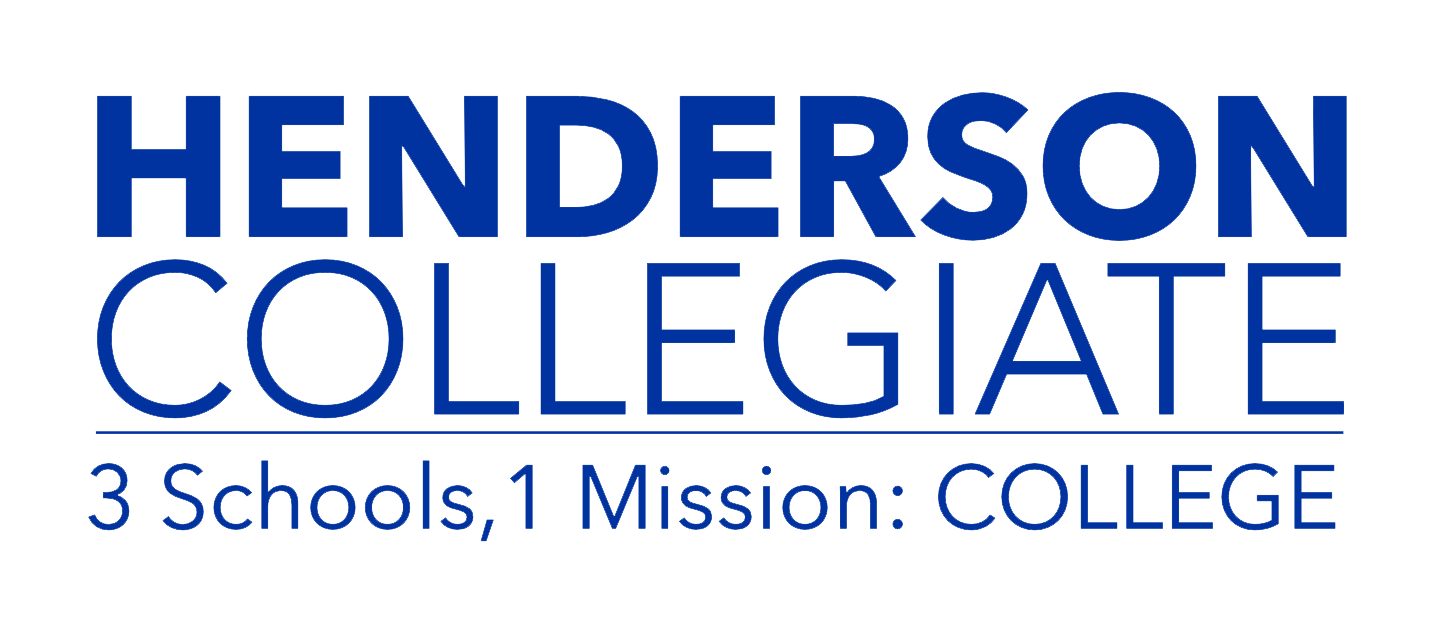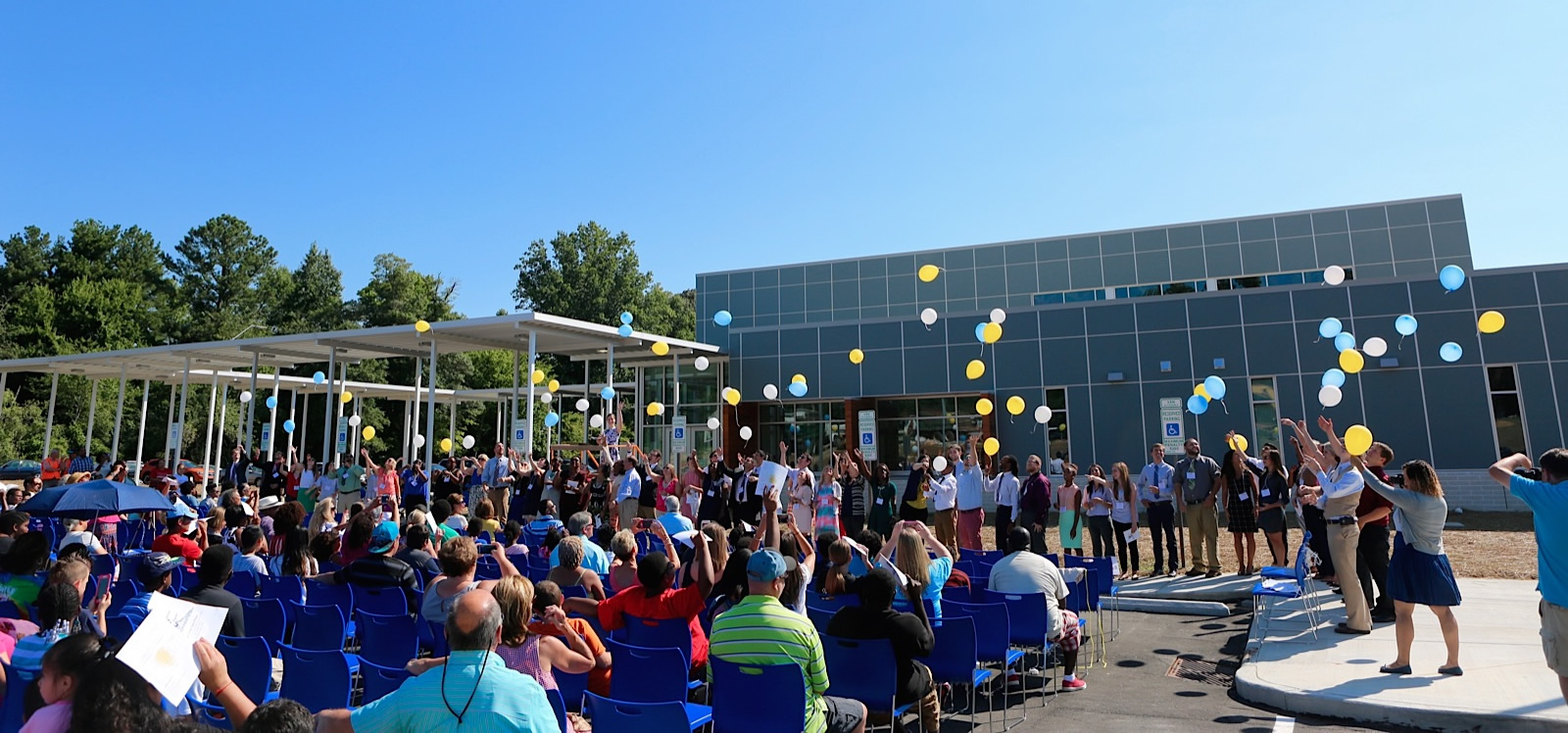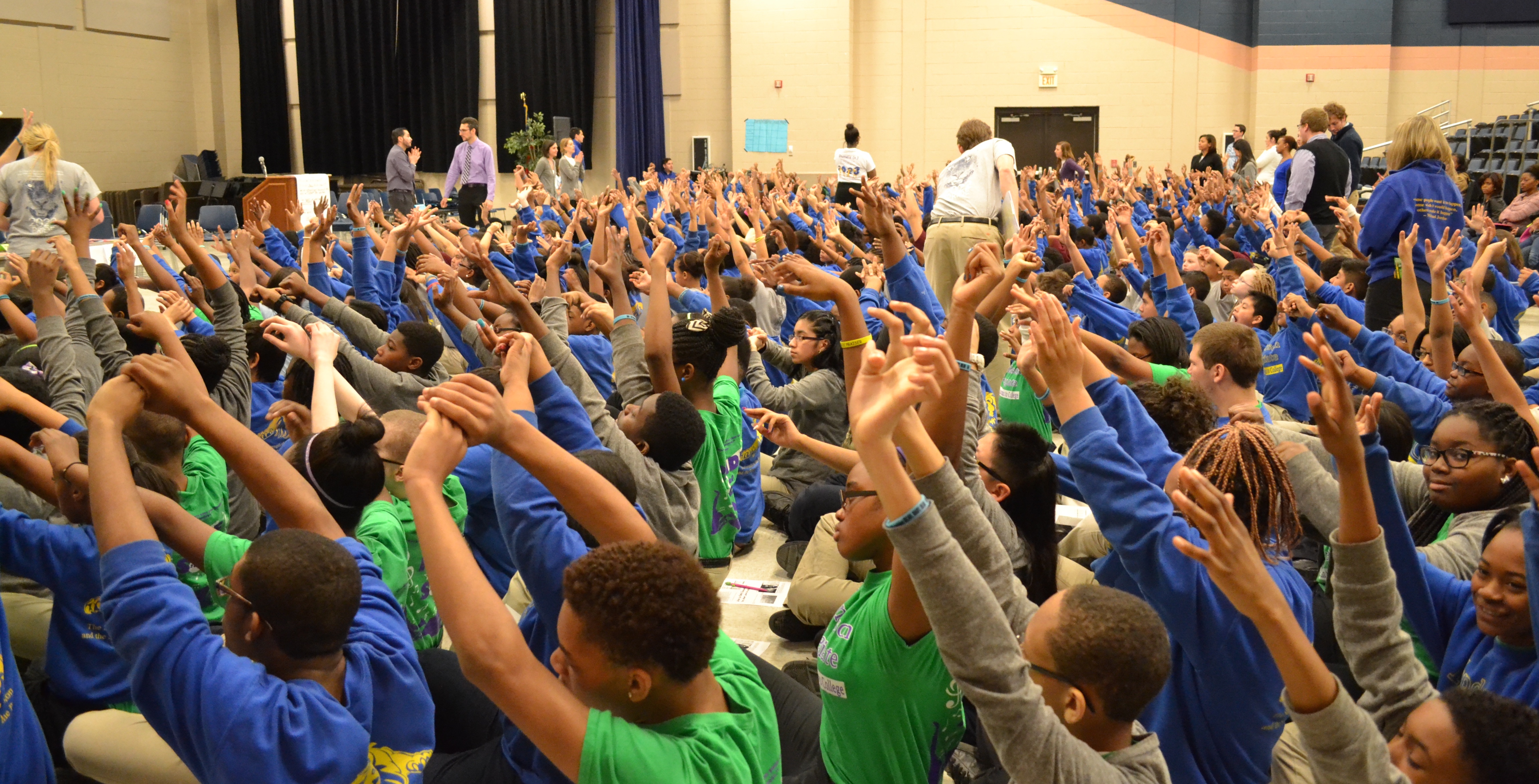With order, energy, Vance charter school excels
Highlights:
Charter school overcomes poverty with character and proficiency
Henderson Collegiate received the state’s highest grade of A-plus
Leaders say their techniques can be used in bigger public schools
Dozens of students sit shoulder to shoulder in the cafeteria at Henderson Collegiate charter school reading novels or puzzling over worksheets as they spoon their cereal.
Except for the occasional whisper between a teacher and student, the room is silent.
This school strives for no wasted movements or wasted moments. The study-hall breakfast is mental preparation for the day’s first class.
The students are in school about 8 1/2 hours most days, not the usual 6 1/2 to 7. They attend a mandatory two-week summer session. All told, the extra time adds up to 26 additional days at school each year.
Teachers are visited by coaches several times a week. Students are taught to help their classmates, and each class is called a “pride.” Students who mistreat someone or who are dishonest or disrespectful are given “bench.” That requires them to wear their shirts inside out and sit in chairs pushed away from the class; they are told to reflect on their actions.
It all appears to be working.
Henderson Collegiate is a high-poverty school where students outperform most of their public school peers around the state in measures of reading, math and science. The school was one of 69 public schools to receive an A-plus in the latest round of performance grades, putting it in the top 3 percent.
It was the only school that achieved the highest mark that has more than 80 percent of its students classified as economically disadvantaged, a News & Observer analysis shows.
The school, in a poor, rural area north of Wake County, markets itself to low-income families. More than 80 percent of the students are African-American or Hispanic. As a charter school, Henderson Collegiate receives public funding but has freedom to do things differently from traditional public schools. That includes having families that have picked the school and are perhaps more likely to buy in to longer days, summer sessions and high expectations for student behavior.
Its founders, Eric and Carice Sanchez, have lofty goals.
“Our goal is 100 percent attending and graduating from the college of their choice,” said Eric Sanchez, the school’s executive director.
The school opened in 2010 with 100 fourth-graders and now has 620 students in grades four through nine. It plans to continue adding grades until it is a K-12 school.
Students sign agreements promising to “work, think and behave” the best they know how, to be truthful, and to accept the consequences of poor choices. Students wear shirts with the school name, khaki pants and black sneakers.
Parents sign an agreement promising to read all papers sent home, check homework, have their children read 30 minutes each night, and attend all school events and parent meetings.
A vocabulary of hand signals and verbal cues are designed to keep students’ attention and maximize instructional time. When teachers ask questions, almost every student raises both hands.
Students are encouraged to raise their hands with straight arms, said Caitlin Terranova, the school’s director of development. “It brings energy to classes,” she said.
During the day, student chants and rhythmic clapping can be heard in the halls.
Students who struggle to answer questions get a show of support from classmates in the form of a hand signal, arms extended with fingers wagging. They call it “showing love.” Teachers praise students by name for supporting their classmates.
The school has no student lockers. Backpacks are left slung over chairs. The message: No one has to worry about anyone messing with their stuff.
The school spends a lot of time on its culture. It teaches social skills, empathy, and “what good people do,” Eric Sanchez said. A strong culture makes classes more efficient and effective, he said.
James E. Ford is program director of the N.C. Public School Forum, an education think tank in Raleigh. He said he’d like to look at the school’s operations to see if the methods could translate to traditional public schools.
“They’re obviously doing something that’s working,” he said.
Expectation of success
Vance County lies about 30 minutes north of Wake and is classified by the state as among its most economically distressed counties. Twenty-eight percent of the population lives below poverty level, compared with 17.5 percent of the state as a whole, according to the latest U.S. Census figures.
About 11 percent of adults 25 and older in Vance have bachelor’s degrees or higher, compared with 27 percent of adults statewide.
Results of statewide tests show that educating students in such an environment is a challenge. Low-wealth schools have largely performed poorly, leading to study after study about what could help.
State education officials and advocacy groups are taking a fresh look at how to confront challenges connected to poverty. The State Board of Education is starting an advisory committee to review challenges of at-risk students, such as poverty, safety and health. The N.C. Public School Forum has a study group considering racial inequity, the impact of trauma on learning, and school funding.
The Sanchezes first came to Henderson in 2002 with Teach for America, which recruits and trains top recent college graduates across the country to teach in low-income communities. Both worked in Vance public schools and at KIP
P Gaston, a charter school in Northampton County. KIPP is a national charter chain that emphasizes college preparation and student discipline.
Eric Sanchez, 36, said Henderson Collegiate is based on a mix of ideas from KIPP and other “no excuses” charter schools that prepare low-income students for college.
“Teach Like a Champion,” a book of techniques by Doug Lemov, is required reading for Henderson Collegiate faculty. The book describes how teachers can manage their classrooms, use data to guide instruction, and minimize student time spent moving from room to room or putting away papers. Using the techniques makes for highly structured class periods.
“Every moment that a teacher is doing something in a room is a learning moment for a child,” Sanchez said. “Every single moment is the opportunity for teachers to further the learning of children.”
State Rep. Nathan Baskerville, a Henderson Democrat, has tired of the debate about whether charter schools are draining money from traditional public schools, a perennial hot topic in Raleigh. He said more attention should be paid to transferring successful strategies between charters and traditional schools.
IT’S A CULTURE AND EXPECTATION OF SUCCESS. THESE KIDS, WHEN THEY START, THEIR FOCUS IS COLLEGE.
State Rep. Nathan Baskerville, D-Vance County, former Henderson Collegiate board member
Baskerville, who was on the school’s board for its first two years, said some of Henderson Collegiate’s practices could translate to traditional public schools.
“It’s a culture and expectation of success,” he said. “These kids, when they start, their focus is college.”
Coaching the teachers
The school pays extra attention to teacher development. A coach observes teachers at least twice a week and records parts of class sessions that are later used in “debriefings,” detailed reviews of teacher performance. First-year teachers are required to attend meetings to discuss “Teach Like a Champion.”
One Tuesday morning this month, Carice Sanchez, 37, the middle school dean of curriculum and instruction, reviewed English teacher Katie Wagner’s teaching techniques shortly after a class on “Of Mice and Men” ended. They talked about how to create a positive classroom atmosphere and to make sure, as Carice Sanchez said, “that everyone is thinking at all times.”
“Kids should not take a moment off in your class,” she said. Carice Sanchez also gave Wagner an assignment: Read a section of “Teach Like a Champion” and email Sanchez her notes by 7 a.m. Monday.
In recruiting teachers, one of the biggest things administrators look for is how they respond to coaching, Carice Sanchez said.
Eric Sanchez said personnel from other public schools have come to Henderson Collegiate to see how it works. But there are obstacles to transferring its ideas.
The state school calendar law, for example, sets limits on when traditional public schools can start in August and end in June.
Extra class time is part of the equation at Henderson Collegiate. In addition to spending more than eight hours at school Monday through Thursday, students have a two-week summer session.
Some critiques of charters such as Henderson Collegiate note that they succeed because they push out students who don’t abide by their rules, and that children whose parents have sought out such a school are more likely to do well.
“Some have argued that strict disciplinary policies are one way that charter schools are able to ‘choose’ which students they will serve,” Kristen Stephens, an associate professor in the Duke University Program in Education, said in an email. “In essence, they have been accused of using discipline as a way to push out ‘problem’ students.”
The state Department of Public Instruction does not keep track of charter school turnover, and the Vance County school district does not track how many of its students left charters.
Though he could not provide specific turnover rates, Sanchez said the school works to persuade older students who see friends with more liberties at other schools, and their parents, to stick with Henderson Collegiate.
Yevonne Brannon, chairwoman of Public Schools First, an organization that supports traditional public schools, said Henderson Collegiate’s strategies that work at small charters won’t work at large urban schools because the traditional public schools take all students no matter their circumstance.
Parents who choose a school and sign an agreement, as Henderson Collegiate parents do, are able to be more involved in their children’s education than some other public school parents, she said.
“Single parents, transient parents, homeless parents, they just don’t have the opportunity,” she said.
Part of ‘the pride’
For students, there’s a focus on character development and being part of “the pride.”
Ella Bess Bumgarner, seventh-grade math teacher, said it’s in seventh grade that students are taught about positive peer pressure and community support.
Students talk about being part of “a beloved community,” Bumgarner said. “They just care about each other.”
The school staff members sign agreements saying they will “do whatever it takes for our students to learn.” Teachers must be available at night to take calls from parents and students.
Bumgarner recalls the school’s early years, standing in parking lots to recruit students. They don’t have to do that anymore.
“The people in this building are teachers because they believe that every single kid in this country deserves an equal opportunity for their educational experience,” she said.
When “you have such a deep-rooted belief that what you’re doing is changing lives and what you’re doing is changing the trajectory of not just a kid, but of a family and a community, then you do work a little bit harder, because you’re not driven by a paycheck. You’re not driven by the hours. You’re driven by an outcome that is bigger than all of that.”
Teachers are paid according to Charlotte-Mecklenburg Schools’ salary schedule, said Terranova, the development director. That is slightly higher than the average salary at traditional public schools in Vance County.
Angela Murphy, head of the school’s parent group, said some families may not be used to the discipline, but most welcome it. The school has little turnover, she said. A few slots open in the higher grades each year.
Murphy enrolled her daughter at the school as a fourth-grader. Ashton is now in the school’s ninth-grade class and plans to attend N.C. State University and become a veterinarian.
Murphy has two older children she sent to KIPP Gaston when Eric Sanchez started to work there. She liked that her children were challenged and decided to enroll her younger daughter in Henderson Collegiate when it opened.
Parents praise the school for its academic focus and safe environment. Children have fun there, too, parents said. The school has a band and sports teams.
Students starting ninth grade this year spent their first day of school in Chapel Hill, on the UNC campus. College trips are frequent, as are end-of-year trips to places such as New York City, Atlanta and Charleston, S.C.
“They reward them greatly,” Murphy said. “These are not experiences most kids have.”
DATABASE MANAGER DAVID RAYNOR CONTRIBUTED.









